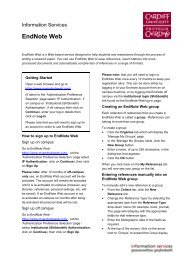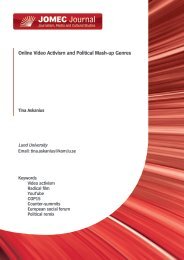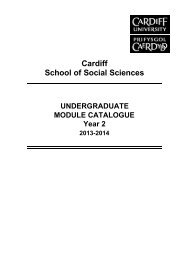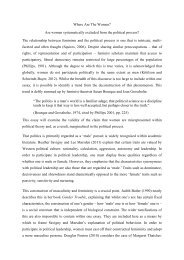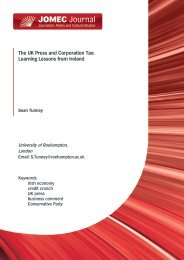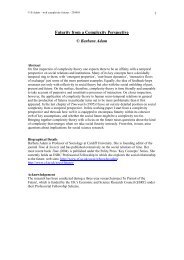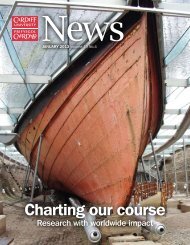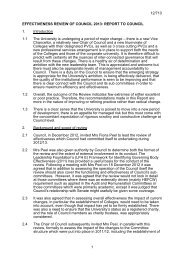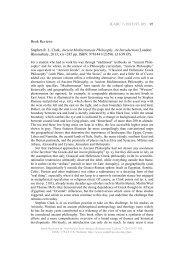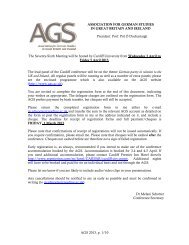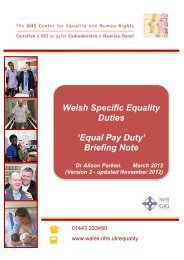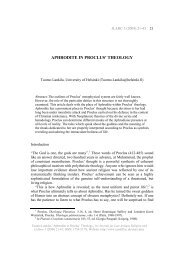RIES Brochure FINAL - Cardiff University
RIES Brochure FINAL - Cardiff University
RIES Brochure FINAL - Cardiff University
You also want an ePaper? Increase the reach of your titles
YUMPU automatically turns print PDFs into web optimized ePapers that Google loves.
Award winning ideas<br />
A guide to writing applications for <br />
research funding
2 <br />
Introduction <br />
Whether you are considering writing your first research application or if you are <br />
a more experienced researcher contemplating your latest bid, securing external <br />
research funding is an important activity which can shape careers in academia.<br />
Winning your own research funding is often a necessity if you are interested in <br />
pursuing your own research ideas (as opposed to working as a researcher on <br />
someone else’s grant) and can provide you with an opportunity to explore a <br />
broader range of projects. Securing funding can seem like a daunting hurdle in the <br />
current climate, where financial cutbacks are in the headlines daily and it seems as <br />
though everyone is scrabbling for cash, but research funds are still available for the <br />
right ideas presented with a well-‐argued case. <br />
On average around one in four grant applications submitted to the UK Research <br />
Councils is successful and secures funding, so it is vital to ensure that proposals <br />
submitted by the <strong>University</strong> are competitive. Standards are extremely high, hence <br />
submitting bids which are merely adequate or ‘OK’ is not an option – as in all <br />
other facets of <strong>University</strong> activity, we should strive for excellence. There are <br />
several reasons for this, including the need to maintain the <strong>University</strong>’s reputation <br />
for quality, but perhaps the most important is to avoid wasting your time and <br />
other resources in preparing an unsuccessful proposal. Many applications are <br />
compromised by minor errors, so remember that following all appropriate <br />
guidelines and taking advice from experienced colleagues can substantially <br />
increase your chances of success. <br />
Writing a research proposal to any standard can be very time consuming, so <br />
deciding to invest the additional effort required to turn a run-‐of-‐the-‐mill bid into a <br />
potentially fundable one should be a straightforward decision. <br />
By following the advice in this guide, the application process can be streamlined to <br />
maximise your chances of success. Vital to this is taking full advantage of any <br />
internal peer review opportunities available to you and making the most of the <br />
services and advice provided by your school’s research office and Research <br />
Development. <br />
Please read through the advice in this guide and contact the Research <br />
Development team in Research, Innovation and Enterprise Services for further <br />
support. We look forward to working with you. <br />
Dr Dave Bembo <br />
Head of Research Development
1. Develop your Ideas <br />
• Start off by jotting down your ideas, and what your intended project will <br />
deliver. <br />
• Be realistic about your goals and the resources you will need to achieve them. <br />
• In particular, concentrate on how you will achieve your research goals and, if <br />
possible, create a rough timeline for your project. Your methodology is very <br />
important. <br />
• Think about the exact nature of your project outputs. <br />
• Think about whether there are other academics in other schools, HEIs or other <br />
external organisations who may become collaborators on your project. <br />
• Think about any additional staff inputs and/or capacity building through <br />
Research Assistants/Associates, administrative staff or postgraduate students. <br />
• Think about any potential problems, how to reduce risks and what you will do <br />
if the project does not go to plan. <br />
• Identify a funder (see the advice below). <br />
• Think about the potential Impacts of your research. Consider external users of <br />
the research results as well as how you will publish and disseminate outputs. It <br />
is important to engage with external stakeholders in the development stage of <br />
your project, not as a ‘bolt on’ when the work is completed. <br />
• Consider your need for any specific legal support from Research, Innovation <br />
and Enterprise Services in relation to, e.g. collaboration with partners, <br />
intellectual property issues, etc. <br />
EU: Be aware that the application process for European Union funded projects <br />
generally takes much longer, making early planning essential. <br />
3
2. Finding a Funder <br />
• Research Innovation & Enterprise Services can offer advice and information <br />
about current funding opportunities. <br />
• They also hold a collection of reference material on the different funding bodies <br />
and the funding schemes they support. <br />
• Visit researchprofessional.com, a UK web-‐based database which offers <br />
comprehensive information about research funding opportunities and research <br />
sponsors. This can be accessed from any networked computer. <br />
3. Get some Advice <br />
• Speak to your Research Office or Research Administrator and check your <br />
school’s internal research application submission process. <br />
• You can also get advice from Research Development Officers (RDOs; see <br />
contacts on back page). They can provide access to a grant applications library, <br />
enabling you to learn from previous, successful applications. <br />
• Check with your Research Administrator, Director of Research or Head of <br />
School to make sure the school will support your application (as, for example, <br />
there may be financial implications for the school). <br />
• Ensure that your application is reviewed by colleagues. Most schools will have <br />
an internal peer review process -‐ find out how yours works. <br />
• Explore any legal/commercial/ethical implications of your research project with <br />
your Research Office or RDO. <br />
4. Costing and Pricing<br />
• Appropriate costing and pricing of research is an essential part of any <br />
application. <br />
• If a project is incorrectly costed, this could result in a financial shortfall, which <br />
may result in your school bearing the cost, or refusing to approve the project. <br />
4
• You will need to complete a Costing and Pricing form (CAP) and this will need to <br />
be signed by your Head of School. <br />
• It is expected that your co-‐investigators will also alert their home school(s) to <br />
the project costs. <br />
• Ask your Research Office for a CAP form. You will need to provide the following <br />
information: <br />
o Proposed start date <br />
o Duration of the project <br />
o Name of funding body <br />
o Host school <br />
o Name of principal investigator and amount of time to be spent on the <br />
project <br />
o Co-‐investigators’ names and amount of time to be spent on the project <br />
o Details of any staff to be employed on the project (name or grade, <br />
amount of time, start/end date etc.) <br />
• This form will be the basis of the accounting system when the grant is awarded <br />
and MUST be signed by your school BEFORE your application can be submitted. <br />
EU: For European Union funding, the European Grants section prepares the <br />
CAP form. Please be aware that European funding models vary significantly <br />
between the various EU schemes and need to be checked before costings can be <br />
prepared. Before requesting a CAP form for EU funding, please contact the <br />
European Office with details of your proposal: European-‐Research@cf.ac.uk <br />
5. Writing Your Application<br />
• Taking into account all of the advice you have received, complete a draft of your <br />
application. <br />
• Double-‐check the requirements and attachments needed for your particular <br />
funding opportunity (e.g. Letters of Support, CV, Technical Appendix, etc.). <br />
• Pay particular attention to all questions and assessment criteria, and remember <br />
that every question is your opportunity to sell your project – do not repeat <br />
information if possible. <br />
• Input all financial information. Staffing costs will be generated on your CAP <br />
form. You will need to work out other costs (e.g. equipment, travel & <br />
subsistence, etc.)<br />
5
• Be realistic about what resources you need and if you need help ask your <br />
school’s Research Administrator or your Research Development Officer (they <br />
can provide a list of possible costs to consider including in a research project). <br />
• Do not write your proposal and then try to ‘bolt-‐on’ the budget at the end. Try <br />
to develop the two strands in tandem so that the resources requested are <br />
reflected and justified in your research plan. <br />
6. Internal Peer Review<br />
• Ensure that you follow your own school’s internal peer review process as <br />
failure to do so may result in a refusal to submit the bid. Some schools have a <br />
very well defined process with early deadlines and clear requirements. Make <br />
sure you find out about these in good time. <br />
• If no internal peer review process exists then give a completed version of your <br />
application to a fellow academic, either in your own school, or elsewhere in the <br />
<strong>University</strong> (e.g. within your College), and ask them to comment on it. <br />
• If you have not yet identified a suitable person, your Research Administrator or <br />
Research Development Officer will be happy to help. <br />
• Allow sufficient time to do this for your internal reviewer to read and comment <br />
fully, and this should ensure that you have time to make necessary changes. (2 <br />
– 3 weeks before submission if possible). <br />
• Take comments on board and make changes where relevant. Do not assume <br />
that criticism is personal. Internal peer review is a way to access your peers’ <br />
expertise and an opportunity to polish your application. Take advantage of it! <br />
7. Submission Process<br />
• Review your application and make sure all the attachments and information <br />
are in order and every question has been answered. <br />
6
• Take your application and completed CAP form to your School Research Office or <br />
HoS for sign-‐off. <br />
• Ask your school ‘approver’ to send the completed, signed CAP form, preferably <br />
electronically, to racd_eds@cf.ac.uk. CU financial guidance states that forms should <br />
be sent no less than 5 working days before the deadline. <br />
• Most applications need an institutional sign-‐off and this adds time to the submission <br />
process. If you try to submit your application two minutes before a formal deadline, <br />
we cannot ensure that we will have processed all of the information in time to get it <br />
to the funder. <br />
EU: The majority of proposals for European Union funding are submitted through <br />
the EC Research Participant Portal where personal registration is required. You <br />
will need to request standard administrative information from the European Office to <br />
support you proposal and to grant access to your proposal account. Email European-‐<br />
Research@cf.ac.uk for more information <br />
8. PI Response<br />
• Some funders will ask you to respond to reviewers’ comments. In many cases these <br />
have a tight deadline to respond, but your responses can make a difference to the <br />
final assessment of your application. You must respond when you are given the <br />
opportunity to do so. <br />
• Do not take any of the reviewers’ comments personally and address any issues raised <br />
in a calm and professional fashion. Consult an experienced colleague for advice. <br />
9. Your Offer Letter<br />
• If your application is successful, alert Research, Innovation and Enterprise Services as <br />
soon as possible. When you receive formal notification we can start to set up <br />
contracts and accounts.<br />
• Consider making your successful application available to others for reference, via <br />
your school or Research, Innovation and Enterprise Services (this can be anonymised <br />
if you prefer).<br />
• If you were unsuccessful, take advice from others in considering how you might <br />
improve the proposal for resubmission or application to another funder.<br />
7
For more information see the Research, Innovation & Enterprise Services <br />
web pages http://www.cardiff.ac.uk/racdv/ <br />
or call 7 5834/9288 <br />
Dr Dave Bembo (Deputy Director & Head of Research Development) Tel: 75159; <br />
bembo@cardiff.ac.uk <br />
Nick Bodycombe (European Office Manager) Tel: 75834; bodycombeN@cardiff.ac.uk <br />
Rebecca Blackwell (European Officer) Tel: 79196; blackwellRM@cardiff.ac.uk <br />
Dr Keith Sexton (European Officer) Tel: 79288; sextonK@cardiff.ac.uk <br />
Sian Jones (European Office Support) Tel: 70171; jonesS123@cardiff.ac.uk <br />
Dr Amanda Jones (College of Biomedical & Life Sciences) Tel: 79296; <br />
jonesAL6@cardiff.ac.uk <br />
Dr Samantha Redman (College of Biomedical & Life Sciences) Tel: 79177; <br />
redman@cardiff.ac.uk <br />
Dr Jennifer Geroni (College of Biomedical & Life Sciences) Tel: 75513; <br />
geroniJN@cardiff.ac.uk <br />
Dr Lee Bartlett (College of Physical Sciences) Tel: 79198; bartlettLM@cardiff.ac.uk <br />
Dr Hywel Edwards (College of Physical Sciences) Tel: 76957; edwardsH3@cardiff.ac.uk <br />
Sally O’Connor (College of Arts, Humanities & Social Sciences) Tel: 75494; <br />
oconnorS@cardiff.ac.uk <br />
Dr Cinzia Yates (College of Arts, Humanities & Social Sciences) Tel: 76377; <br />
yatesCA@cardiff.ac.uk <br />
Louise Lewis (Research Development Support) Tel: 79430; lewisLMG@cardiff.ac.uk <br />
Ruth Middleton (Research Development Support) Tel 79626; <br />
middletonR2@cardiff.ac.uk



